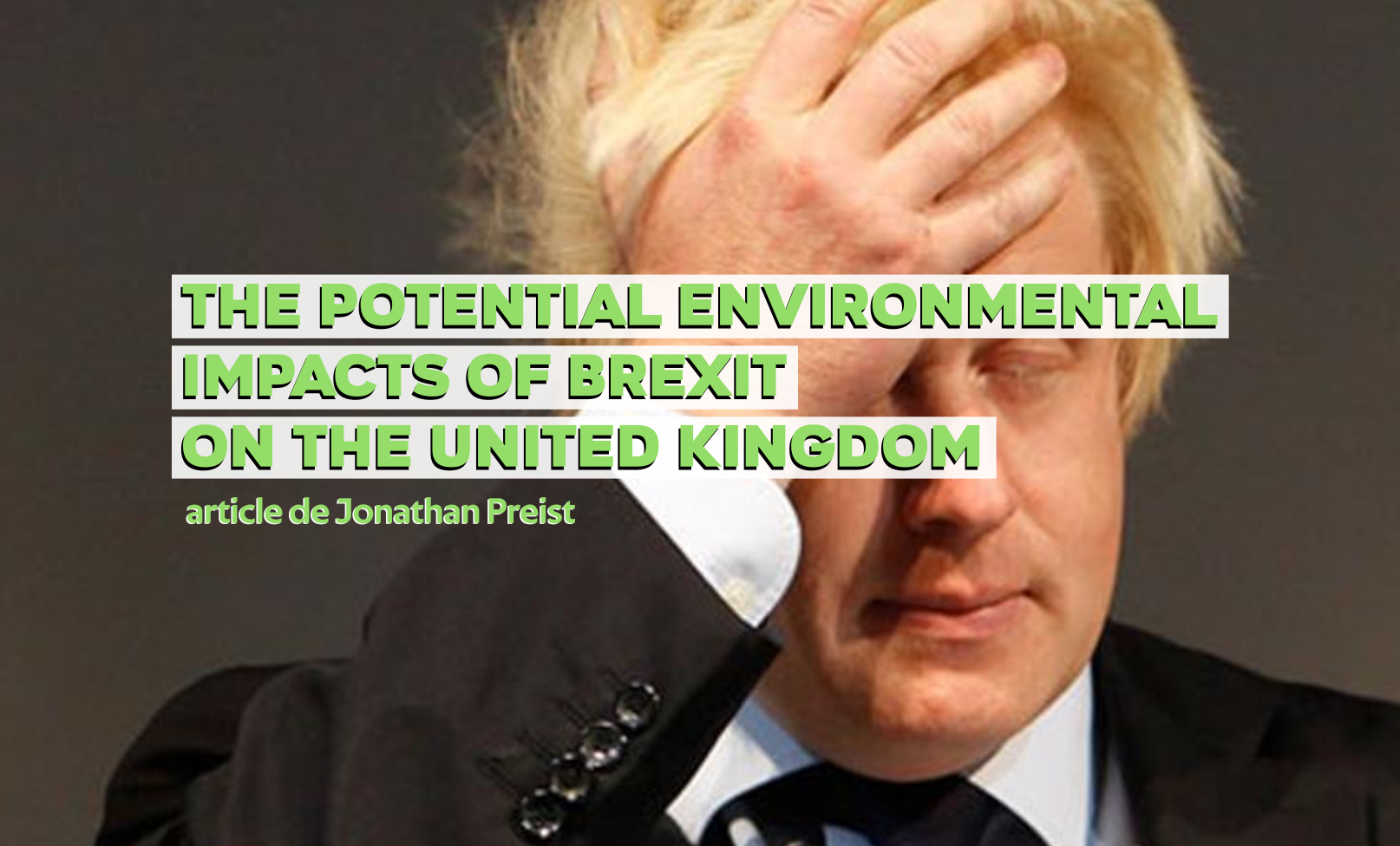article de Jonathan Preist (RSEDD 2018)
On 23 June 2016 the United Kingdom held a referendum on European Union (EU) Membership, with the outcome that the British public voted to leave the EU by a margin of 52% to 48%. At the time of the writing of this article the United Kingdom is still part of the EU and the future of its EU membership is unclear however, should the UK leave the EU at some point in time, the environmental impacts could be significant. Four domains of potential impact are presented in this article: Regulatory gaps in UK environmental policy; governance gaps; policy incoherence across the four UK nations; and deliberate relaxation of environmental policy.
Regulatory gaps in environmental policy
Regulatory gaps could exist if national laws are not modified to fill the void created when the currently applicable EU regulations cease to be applicable: EU directives are currently incorporated into UK law via domestic legislation and will therefore remain in place once the UK leaves the EU. EU regulations, however, have been incorporated into UK law via article 2 (2) of the European Communities Act (ECA) of 1972. When the UK leaves the EU, any regulations given legal force in the UK under the provisions of article 2(2) would cease to apply. To address this concern, the UK government produced the EU Withdrawal Bill (EUWB) to convert all EU law into ‘retained EU law’ from exit day onwards. The adoption of this bill addresses the regulatory gaps issue however there is a risk that the UK will be unable to perform the review of all the EU laws in the required timescale prior to leaving the EU. For example, in the event of a hard Brexit, the EU regulation for the Registration, Evaluation, Authorisation and Restriction of Chemicals (REACH) would cease to be applicable in the UK, necessitating the creation of a duplicate scheme UK-REACH. This would require significant legislative effort in the short-term and create an additional burden on businesses in the long term.
Environmental governance gaps
EU membership enables the UK to draw upon expertise from the European Commission and a range of Agencies including the European Chemicals Agency (ECHA) and the European Environment Agency (EEA). Once the UK leaves the EU, it will probably lose access to these forums and their associated databases and the understanding of chemical hazards within the UK could become progressively eroded.
As an EU member, the UK is obliged to provide reports to the Commission on its ability to meet environmental targets. These reports are then published in the public domain, enabling citizens and NGOs to hold the UK government to account on its environmental performance. Furthermore in the event of shortfalls to EU legal requirements, the Court of Justice of the EU (CJEU) can prosecute member states. The UK is regularly prosecuted by the CJEU and the majority of prosecutions concern environmental issues. For example in 2017 the UK consistently exceeded ambient air quality limits for nitrogen dioxide and paid daily fines to the EU as a result.
The UK government’s response has been to propose the creation of an Office of Environmental Protection (OEP) as a watchdog to replace some of the functions that are currently performed by the CJEU and the European Commission, however the OEP would have an advisory role and not have the power to impose fines. There is therefore a risk that seeking economic competitiveness could lead to limits being exceeded more frequently than under currently-applicable European law.
Environmental policy incoherence across the UK nations
In the 1998 devolution settlement, the UK devolved significant powers from its central government in London to parliaments in Scotland, Wales and Northern Ireland. As an EU member, subject to the Treaty on the Functioning of the EU (TEFU), the UK and its devolved administrations are committed to the minimum EU environmental standards defined in the Environmental Guarantee Article 193 of the TEFU. Since devolution, there have been some notable differences in environmental priorities and performance between the four UK nations. There is a danger that, without the minimum safeguards provided by EU legislation and in the absence of an equivalent UK framework, there could be a regulatory “race to the bottom” in the name of competitiveness. This is particularly applicable to the domains of biodiversity and habitats creation currently covered by the EU Birds Directive of 1979 and the Habitats Directive of 1992, where the relaxation of rules by deregulated administrations to facilitate development in currently protected areas is a distinct 9possibility.
Deliberate relaxation of environmental policy
The EU environmental policy-making process is very consensual, leading to a policy-making process that is quite slow but extremely stable compared to domestic policies of EU member states. The process also provides long time horizons that enable businesses to adapt progressively. The EU has expressed concern that the post-Brexit UK will introduce weaker environmental standards in order to secure competitive advantage and UK environmental NGOs are concerned that national policies may be more volatile than those of the EU. The integration of the UK governmental Department for Energy and Climate Change into the Department for Business, Energy and Industrial Strategy is an indication that important environmental issues such as climate change may be put in the back seat with business at the steering wheel.
Despite assurances by the government that Brexit presents an opportunity for the environmental performance of the UK, there are a number of indications of likely shortcomings in maintaining and improving environmental standards and ensuring governmental accountability. These shortcomings may be further compounded by a legislative burden for which the country is inadequately prepared and complications related to administrative devolution within the UK that could lead to the existence of loopholes that could be used by businesses to comply with the spirit of the law.

